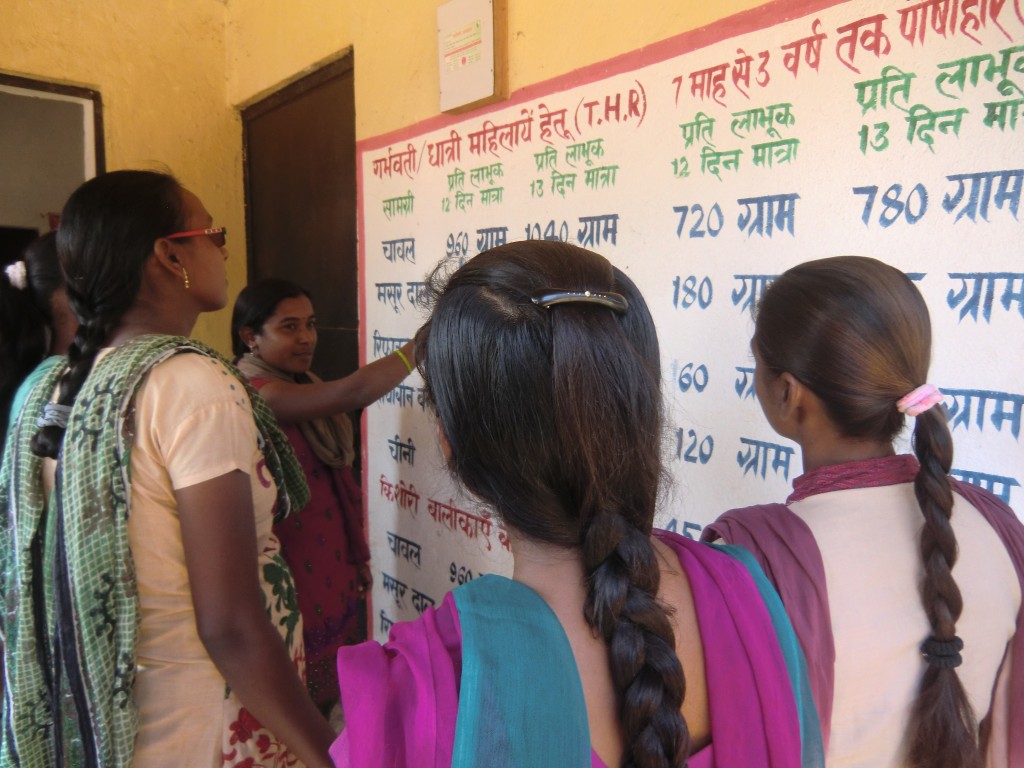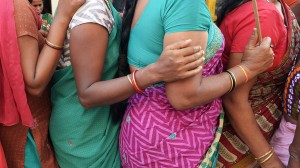India – Singing and Counseling Young Mothers on Health (II)

Barefoot Auditor Suman Devi, 25, who writes, composes and sings songs on health, sanitation and regressive social practices such as child marriage and dowry, takes pains to explain the importance of adequate nutrition for pregnant women. (Credit: Ajitha Menon\WFS)
When the melody comes to an end, in the ensuing stillness, Suman opens a discussion on healthcare for women and adolescents. How successful is this method?
Siben Devi’s masterful assessment is bang on. In each of the 70 project villages, the impact of the intervention is visible. Today, the ICDS is functioning without a hitch, infants get their government-sponsored meal on time every day and their height and weight is being tracked to monitor malnutrition. The Anganwadi workers and the Sahiyas carry out the routine immunizations without fail, the pregnant and lactating women get their nutrition packets every month. The women and adolescent girls are taking their iron pills and the blood testing for anemia is being done on a regular basis. The expectant women are going for all the four pre-natal check-ups and their blood pressure and sugar levels are being watched closely. Almost all childbirths in the last three years have taken place at a hospital and the infant mortality and maternal mortality have been remarkably low in all these villages in this period.
“Our barefoot auditor Rita Kumari has changed our lives. Earlier, we had no idea about the government health services let alone availing of them or benefiting from them. It is her repeated counselling and campaigning that has made everyone in the village realize the significance of these services. Nowadays, we treat her advice as gospel truth,” says Gudiya Devi, 35 of Palu village.
In the last three years, only one woman in Palu has died in childbirth and that too because her husband failed to call the barefoot auditor or the free Mamata ambulance service when her labor pains started, despite repeated counselling in the past. “We give our number to the pregnant women and their husbands and also write the number for the free ambulance service available under the Janani Suraksha Yojana [a safe motherhood intervention under the NHM] on the walls of their homes and at the village office. The moment we get the call, we ring for the free ambulance and reach the pregnant woman’s house. I have often accompanied the women to the Primary Health Centre or the hospital,” says Rita Kumari, 26, Palu’s esteemed barefoot auditor.
Apart from counselling pregnant women and their families, Rita and other barefoot auditors have become the trusted friends of teenage girls and young women in the community as most of them are young – between 20 to 30 years – and are able to relate better to their concerns. “I was using cloth during menstruation and it was very uncomfortable. Due to constant itching, I got infection but I could not even tell my mother,” recalls Suman Kumari, 17, of Palu village. Fortunately, the youngster was able to shed her inhibitions in front of Rita. “I spoke to her as she was more approachable. She took me to a doctor for treatment and told me to use the cheap sanitary napkins being provided by the government through the Sahiyas. Now every girl in our village uses napkins that come for Rs 6. I even convinced my mother to start using them,” Suman elaborates.
Besides solving their health problems, the barefoot auditors have won the confidence of the younger girls as they staunchly stand up against child marriage, domestic violence and dowry. Take the case of Gudiya, 15, of Bada Ulatu village. When she discovered that her parents had fixed her marriage, she sought the help of Poonam Kumari, 20, the barefoot auditor. Not only did Poonam speak to the marriage broker, Rashmi Devi, and pointed out that she could end up in jail for facilitating an underage union, she even got Rashmi to convince Gudiya’s parents to break the alliance.
Talk about barefoot auditors in any of the 70 villages and there are many glorious stories that people come forward to share. Clearly, they have emerged as a skilled force that is providing much-needed counsel, improving access to healthcare and gradually turning the wheels towards positive social change. (© Women’s Feature Service)
Author: Ajitha Menon
Editor: Marjory Linardy
WTO RECOMMENDS
To be or not to be India’s Daughter?
On the occasion of International Women’s Day, NDTV, India’s largest English news channel, was due to broadcast British filmmaker Leslee Udwin’s documentary India’s Daughter. The film is based on the brutal murder and gangrape of a 23-year-old physiotherapy student, Jyoti Singh also known as Nirbhaya which means ‘The Fearless One’. (March 8, 2015)
An Indian girl was allegedly molested on a flight
India’s image in the world is synonymous with the Taj Mahal, the snake charmers and sexual violence. It is nothing new to hear of another incident of harassment, as it is common knowledge that the women in India are regularly subjected to inappropriate touching, sexual harassment, eve teasing and rape. (Februar 10, 2015)
Talking about Safe Sex with Teens
Pooja Behara (name changed), 16, would probably have never realised that she was suffering from a sexually transmitted disease (STD) had Sabita Buta, a counsellor with a local non government organisation, not come into her cramped slum in Bhubaneswar, the state capital of Odisha, to talk to the adolescent children about HIV/AIDS and the importance of safe sex, sometime early last year. (From Februar 2, 2015)
http://blogs.dw.com/womentalkonline/?p=14559 http://bit.ly/1GwBSKi







